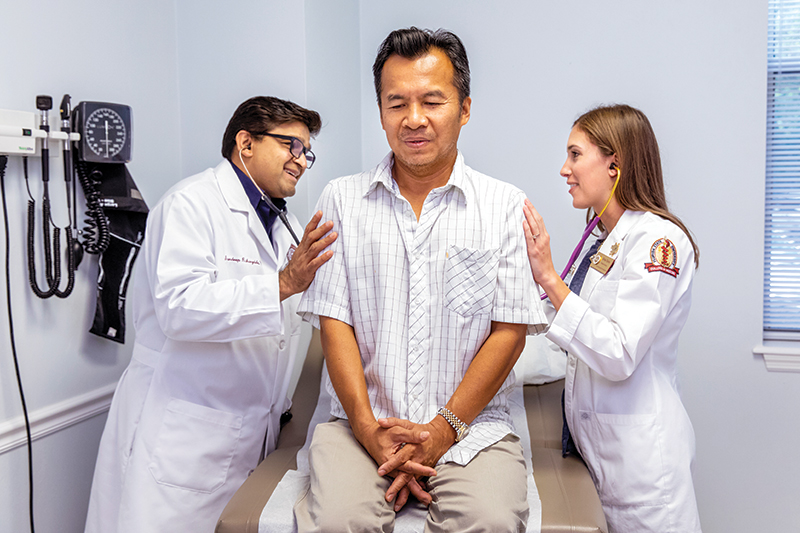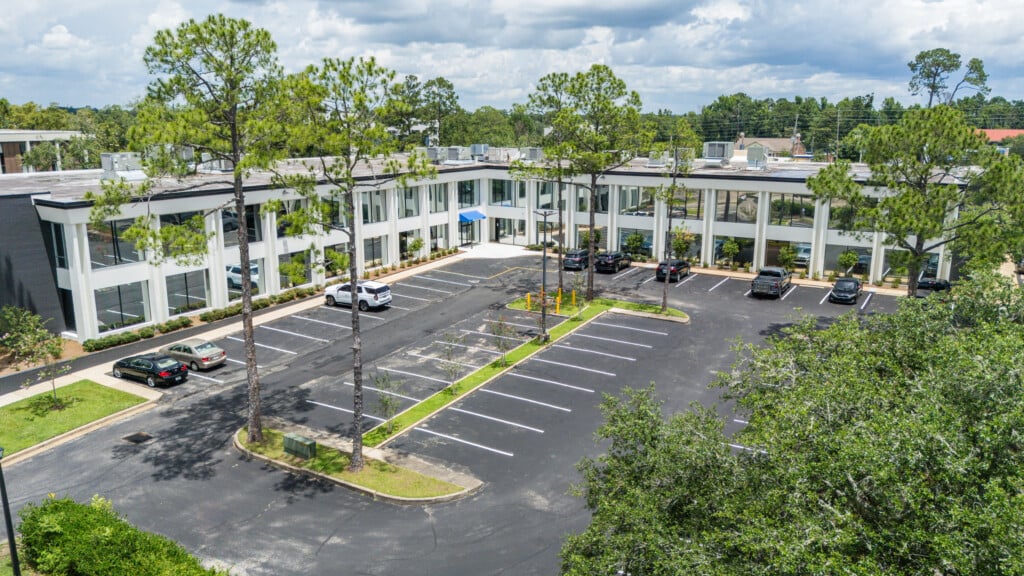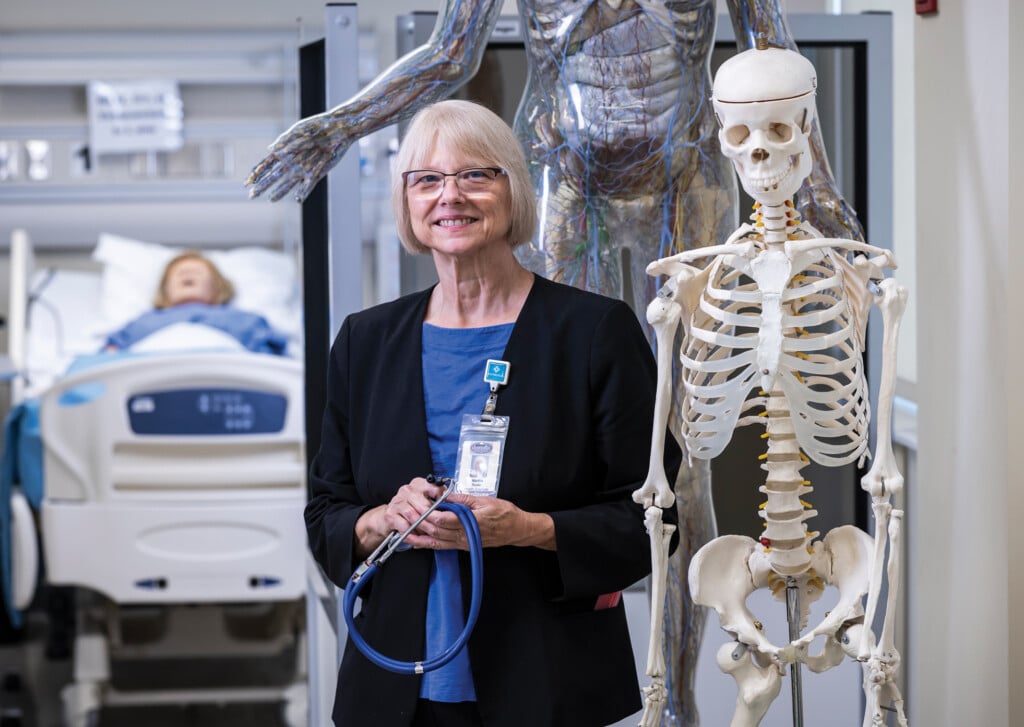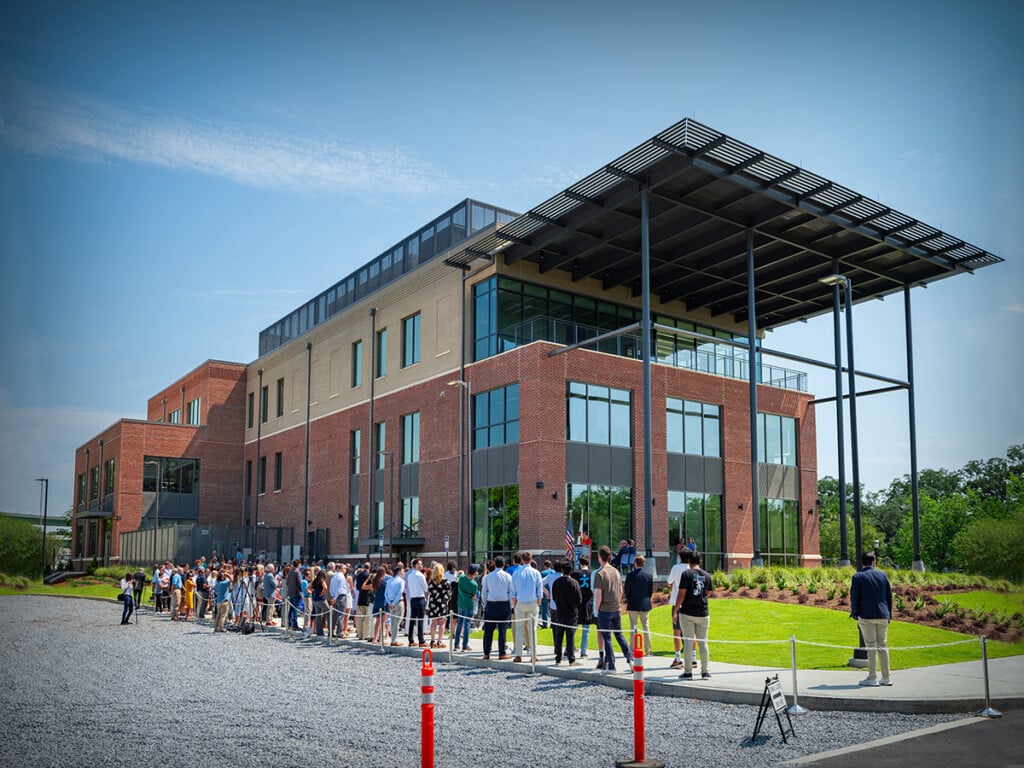Community-based Health Care
FSU College of Medicine pioneers a new model

When Dr. Alma Littles was in second grade, her teacher told the bright, young girl she would make a good doctor someday.
“I didn’t know what that meant,” said Littles, the youngest of 12 children growing up in Quincy. “I don’t think I had ever seen a doctor.”
That young girl did indeed grow up to be a family physician, treating residents of her hometown, an area where doctors were scarce.

Dr. Alma Littles, Interim Dean of the Florida State University College of Medicine
Littles’ career as a physician, educator and health leader blossomed, and in February 2023, she was named the interim dean of the Florida State University College of Medicine, a school Littles helped create, with a mission that reflects her own life story.
“We were developing physicians who would practice personal and patient-centered care, focusing on populations of need, the underserved, geriatric patients,” Littles said.
“I called it my personal, professional mission.”
The FSU College of Medicine was created in 2000 by the Florida Legislature to take an unconventional approach with an unwavering commitment: The new medical school was to use community-based clinical training to educate its students, create a technology-rich environment and address primary care health needs of Florida’s citizens, especially the elderly, rural, minorities and underserved.
The model: Medical students would spend their first two years at the central FSU campus in Tallahassee. In their third and fourth years, instead of studying in an academic medical center, students would complete their clinical rotations at one of FSU’s regional settings in Daytona Beach, Fort Pierce, Orlando, Pensacola, Sarasota or Tallahassee (separate from the main campus).
The college also has rural training sites in Marianna and Immokalee. The clinical training program extends into hospitals, skilled nursing facilities, managed-care organizations, private clinics and other outpatient settings, according to the medical school’s website. Students work one-on-one with local health care providers. Ideally, they will return to these places, or others like them, to practice.
“It wasn’t the traditional medical education model,” said Littles, previously the medical college’s senior associate dean for medical education and academic affairs for nearly 20 years.

↑ Dr. Joedrecka Brown Speights, chair of the College of Medicine’s Department of Family Medicine and Rural Health, talks with a patient at one of the college’s clinics while a student observes. Photo by Colin Hackley Photo
Has this untraditional method worked? For starters, consider the numbers from the FSU College of Medicine’s 2022 Annual Report.
“Through 2021, more than half of the college’s M.D. alumni matched in one of these primary-care specialties: internal medicine, family medicine, pediatrics or obstetrics-gynecology.”
“Most alumni now practicing in Florida are in primary care, and a good percentage of those are in rural or other underserved settings, where recruiting new physicians can be a challenge.”
Figures from the Association of American Medical Colleges, which examines how the FSU College of Medicine compares to all other U.S. medical schools (155 accredited schools), show FSU is in the 95th percentile for practicing in underserved areas, 85th for training in family medicine, 83rd for practicing in state and 86th percentile for practicing in primary care.
At the outset, the college faced plenty of hurdles. The medical establishment said there were enough doctors. Local advocates knew that wasn’t the case.
The FSU College of Medicine was the first new medical school in the U.S. for roughly 20 years.
Medical groups later changed their outlook. In its 2022 study, the American Medical Association reported that the U.S. faces a projected shortage of between 37,800 and 124,000 physicians within 12 years — many of those (between 17,800 and 48,000) are primary care physicians.
“FSU was a pioneer,” said Dr. Dean Watson, vice president and chief integration officer for Tallahassee Memorial HealthCare. “Once FSU went through the process, numerous medical schools followed.”
Watson was present for those early discussions about the college. “There were six or eight of us sitting in trailers creating this, and now you’ve got hundreds of very bright people involved,” Watson said. “The college has elevated health care across the board.
“FSU has also brought in great faculty members that are focused on providing high-quality care for the underserved,” Watson said. “It’s a win-win.
“We view each other as true partners,” he said.
This partnership received a boost from the Florida legislature in 2022. FSU and TMH have joined forces to build the FSU Health Tallahassee Center, which will offer advanced medical training and research opportunities.
The building, funded by a $125 million appropriation from lawmakers, will be located on the TMH campus, providing educational, medical and research laboratory space, drawing on talent from TMH clinicians and faculty from the FSU College of Medicine and College of Nursing.

→ First- and second-year medical students from the Florida State University College of Medicine use teddy bears to teach children the basics of a health exam at the FSU Childcare and Early Learning Program in December 2021. Teaching children not to fear a trip to the doctor should begin at an early age. Photo by Colin Hackley Photo
It’s the latest step for the FSU medical school, which has launched outpatient care and facilities in struggling communities.
FSU PrimaryHealth is based in southwest Tallahassee, a place where students work with physicians on a hands-on basis in a real-world setting.
“They’re located about a block away,” said Shannon Davis, principal of Sabal Palm Elementary School, which is a Title One school. “This is one of the most poverty-stricken areas in the state. They’re in a prime area to serve families who are in great need of physical care.”
Sabal is Tallahassee’s only community partnership school, where four core providers offer services under a 25-year contract. “FSU is our health care provider partner,” Davis said.
One case involved a sickly boy raised by a grandmother struggling to get him medical services. Sabal Palm connected the child with FSU PrimaryHealth.
“He’s now there on a regular basis, and he’s happier and healthier,” Davis said. “All of a sudden, he has resources open to him that were not available to him in the past. Now, we’re seeing a different child.
“There are many other stories like that,” she said.
The college partners with more than 170 health care organizations statewide.
“You can look at the work that has been done for children and maternal health in Gadsden County through the College of Medicine,” said Dr. Temple Robinson, chief executive officer of the Bond Community Center. “Look at the establishment of the FSU PrimaryHealth Center in Leon County. The College of Medicine’s footprint is all over the state of Florida.
“Our relationship with the College of Medicine is seamless because we have a common mission, and that is to provide health care to underserved populations, elderly, rural and minority populations,” she said. “That goes hand in glove with the College of Medicine’s mission.”

↘ Graduate students in the College of Medicine’s doctoral program in biomedical sciences, joined by medical students, use models of the human brain as teaching tools at the Tallahassee Science Festival at Kleman Plaza in October. Photo by Colin Hackley Photo
It’s a different model that “produces excellent students,” said Dr. Rudolf Hehn, who recently retired as the Thomasville/Archbold Hospital site coordinator for the FSU College of Medicine’s Tallahassee Campus. “The college has done an outstanding job of fulfilling its mission.
“The primary emphasis is to work with physicians in an actual community instead of working out of a hospital that might have 1,000 beds and treat diseases that are very complicated, unusual or unique,” said Hehn, a member of FSU’s Alumni Hall of Fame.
To fulfill its mission, picking the right, empathetic students is essential, Littles said.
The FSU College of Medicine receives more than 7,000 applications a year for 120 slots in each class. Sixty students are selected each year for the Physicians Assistant program. “They obviously have to have the academic credentials,” Littles said. “We have to look beyond that.”
The college looks for students who have demonstrated an interest in “focusing on the unique needs of patients from all walks of life,” she said.
Many students are also from varied backgrounds.
FSU College of Medicine is in the 97th percentile for graduates who are black or African-American, 90th percentile for faculty who are women and 91st percentile for graduates who are Hispanic, Latino or Spanish, according to the AMA figures in the university’s annual report.
Dr. Christie Alexander was among the 30 students in the College of Medicine’s first graduating class in 2005. She was also the first alumni to become a full-time faculty member.
Alexander called herself an unofficial poster child for the school.
“I come from a nontraditional background,” she said. “I was 28, older than most students coming into medical school, with life experience under my belt. I’m a woman, and I come from a Puerto Rican family.”
Alexander, who later became president of the Florida Academy of Family Physicians, said students “were very much mission-driven” in a college envisioned as a game changer.

↑ At FSU PrimaryHealth, based in southwest Tallahassee, students work with physicians on a hands-on basis in a real-world setting. Photo by Colin Hackley Photo
Alexander is still immersed in primary care, but she has recently left FSU. On a road trip, she discovered that the tiny town of Marfa, Texas, needed a physician. She’s decided to stay.
“Everybody, in a sense, is underserved here,” she said.
The college fosters such devotion, said Dr. Alexandra Mannix, a 2014 graduate of the College of Medicine.
“It provides a foundation and passion for education and leadership and advocacy,” said Mannix, the assistant program director of the UF Health-Jacksonville Emergency Medicine Residency Program.
Most of all, the college is seen as a source for those who might otherwise be forgotten. “When we need to do something, we’re going to knock on their door and say, ‘Please help,’” said Davis, of Sabal Palm. “And they always do.”


